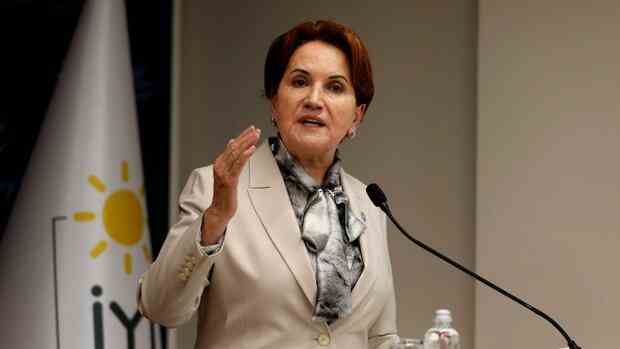Ankara The Turkish opposition is in agreement – actually: President Recep Tayyip Erdogan should be voted out. Ten weeks before the election, however, it is not clear who wants to challenge the autocratic head of state at the polls.
Because an alliance of opposition parties is arguing about the nomination of the opposing candidate. The largest opposition party, the CHP, wants to nominate its own party leader, Kemal Kilicdaroglu. The second largest party, the Iyi Party, and its party leader Meral Aksener are against it. Aksener favors the opposition mayors of Istanbul, Ekrem Imamoglu, and Ankara, Mansur Yavas as candidates.
According to a statement late Thursday evening, the alliance of six – to which the Iyi party belonged at the time – had actually agreed on a common candidate in the race for the presidency. The name initially remained a secret. Who the alliance will set up should be announced on March 6, according to the joint statement by the parties on Thursday evening.
A few hours later, Iyi boss Aksener made it clear: There was never an agreement. Apparently, the “six table” wanted to make the CHP party leader, who had been defeated in the polls, a candidate on Thursday evening. Aksener speaks of fraud and that she was forced to nominate the unpopular CHP boss Kilicdaroglu as a candidate.
Now the anti-Erdogan alliance is threatened with collapse. Because the Iyi party left the alliance on Friday. Iyi Chair Aksener said it was regretted that the anti-Erdogan alliance had lost its ability to reflect the will of the people.
“The IYI party has been caught in a bind,” Aksener declared in a furious speech, “forced to impose an imposition of a choice between death and malaria.” The Iyi party will not bow to this.
After the earthquake disaster, head of state Erdogan is stricken
Insiders want to know about quarrels and wars of words among the opposition parties. “Iyi party officials are already reporting that they could form their own nationalist alliance and nominate their own candidate,” wrote columnist Muharrem Sarikaya of the Habertürk newspaper on Friday.
In addition to the CHP, the alliance also includes two breakaways from Erdogan’s AKP: the Deva party of ex-Economics Minister Ali Babacan and the Gelecek party of former Prime Minister Ahmet Davutoglu. The Alliance also includes the Democrat Partisi and the Saadet Partisi (Happiness Party).
The largest opposition party, the CHP, wants to nominate its own party leader, Kemal Kilicdaroglu.
(Photo: Reuters)
The Turkish head of state Erdogan has been politically affected since the earthquake disaster at the beginning of February. But without an opponent, Erdogan could assert himself in the election, although a growing majority in the country wants the autocratic head of government to be voted out of office.
However, the political aftermath of the earthquake could also present the opposition with an opportunity to depose Erdogan. Kilicdaroglu has managed to boost his reputation over the past two weeks, says Wolfango Piccoli of consultancy Teneo. “He took the opportunity to go on the offensive against Erdogan after the devastating natural disaster.”
>> Read here: More than 50,000 earthquake deaths in Turkey and Syria
The extremely high inflation is also a good opportunity for the opposition to strengthen their influence. On Friday, the national statistics institute announced that the inflation rate was still more than 50 percent.
But the majority of the opposition is more concerned with itself than with the voters. So far, the alliance has only been able to agree, in the event of an election victory, to convert the presidential system back into a parliamentary system, to strengthen the rule of law and freedom of the press and to curtail the power of the president.
After the resignation of the Iyi party, there are now more and more rumors that the alliance against Erdogan could further collapse. Should that be the case, the opposition parties run the risk of stealing votes from one another. Erdogan in particular would benefit from this.
Surveys do not show a clear picture
The results of two surveys after the earthquake do not paint a clear picture. The survey by the Turkish survey company ORC around two weeks after the earthquake sees Erdogan’s AKP party below the 30 percent mark for the first time. Accordingly, the ruling party comes to 29.1 percent, the CHP to 23.5 and the Iyi party to 19.5 percent.
The parliamentary and presidential elections are taking place in the shadow of the effects of the earthquake in early February that killed more than 45,000 people.
(Photo: via REUTERS)
The HDP, which does not belong to any alliance, achieved 8.1 percent and Erdogan’s coalition partner MHP 5.4 percent. In Turkey, on May 14, election day, both the parliament and the presidency will be re-elected. According to this survey, the government would lose its majority in parliament.
Another, previously unpublished survey by the Institute Team sees the alliance of AKP and MHP at a good 45 percent, more than five percentage points more than in the ORC survey. The difference is too big for a statistical error. The survey period was almost identical two weeks after the earthquake.
It is likely that some of the respondents do not have a clear tendency as to who they want to vote for. A united opposition could take advantage of this fact. But Erdogan’s opponents currently seem a long way from that.
The parliamentary and presidential elections are taking place in the shadow of the effects of the earthquake in early February that killed more than 45,000 people. At least two earthquakes measuring 7.8 and 7.6 destroyed houses, roads and infrastructure over a third of Germany within a few hours.
The construction will take years and, according to the World Bank, will cost 34.8 billion US dollars. Erdogan still wants to stick to May 14 as the election date.
More: Turkey is turning the central bank into a disaster tool
